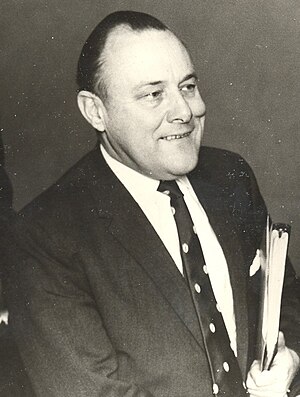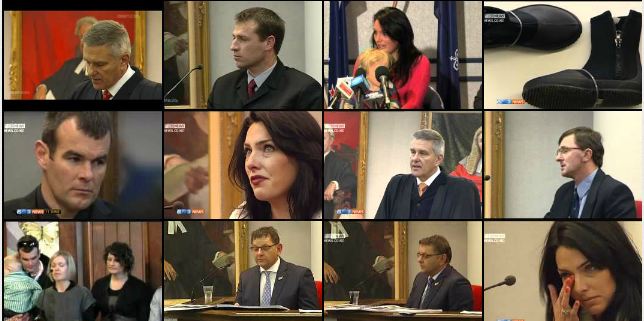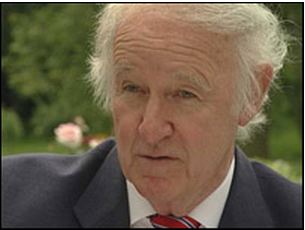
New Zealand Minister of Finance (later Prime Minister), Robert Muldoon, Thurs. 26 June 1969. (Photo credit: Wikipedia)
We read with interest an interview with Jonathan Eaton the barrister who headed up defence counsel in a double jeopardy case successfully defending the accused, Mr Gwaze, resulting in his second acquittal.
Mr Eaton in the interview was apparently attempting to offer the now also acquitted Ewen McDonald advice on how he should cope with the likely abuse he would suffer at the hands of a New Zealand minority, those who would happily stand side by side with a red necked and bigoted lynch mob.
Mr Eaton called it “the David Bain effect”, a very strange but accurate analogy and a phenomena that has apparently again manifested itself in New Zealand with yet another name and another criminal trial, following David Bain’s successful appeal against his wrongful conviction as a teenager and the 13 years of incarceration for the wrongly alleged mass murder of his entire family: a conviction that relied heavily on a highly dodgey police investigation.
This phenomena, however, is not without precedent. In New Zealand this insidious form of carping has a long history. There are many examples, especially when it comes to New Zealand’s lengthy list of judicial cock-ups.
This is but one more, albeit important in a long held tradition. Another good example is to be found in the case of Lynley Hood, a supporter of another who stood, we believe, falsely accused and suffered the terrible fate of being wrongly accused in the 1990’s, that case has, unfortunately, yet to be satisfactorily resolved.
Hoods book, “A City Possessed: The Christchurch Civic Creche Case” (Longacre Press, 2001, ISBN: 1877135623, 9781877135620) details that story and its an amazing read for those that are interested in serious miscarriages of justice.
Such is New Zealand’s recent history of the Judiciary and police getting it wrong that one of their own, retired High Court judge Sir Thomas Thorp, thought it worthwhile to produce a comprehensive report, titled “Miscarriages of Justice” (2005), listing all of the convictions he felt were either wrong or unsafe and the reasoning behind his concerns.
Interestingly Thorp J would have been well placed to understand just how the police operated having been the crown prosecutor in Gisborne for many years (1963 to 1979). Gisborne police in the 1980’s and 90’s becoming notorious, with allegation after allegation of police brutality and corruption…a police district that was overseen by the now convicted corrupt Rotorua cop Detective John Dewar
Whilst Mr Eaton was undoubtedly right on the mark in his assessment of the ongoing shit that Ewen McDonald will likely face at the hands of the local red necks and couch experts following his acquittal; the great unwashed who make it their unqualified business to publicly air their disagreement with the jurors verdict; we believe that Mr Eaton should have cast his net much wider when using this type of comparison.
The fact is New Zealand’s justice system has a horifying history of getting it wrong and many of its citizens, even when confronted with irrefutable evidence of wrongful conviction, continued to scream guilty.
Interestingly it has only been in recent years that this trend has started to reverse, and there in lays the cause of “the David Bain effect” and more importantly paradoxically,we will argue, a likely contributing factor in the juries decision to acquit Ewen McDonald.
Since 1970 there has been a slow but steady increase in the publics knowledge of what happens in criminal trials – largely thanks to the advent of the medias, in particular television, more in depth reporting of major trials, appeals and judicial cock-ups.
The first trial that was to grip this very little pacific nation was that of Arthur Alan Thomas, who stood accused of murdering Jannette and Harvey Crew. Thomas was convicted only to be released some elevn years later following investigative journalist, David Yallop’s secretive meeting with then prime minister Robert Muldoon, prior to Yallop publishing some of his findings (by mutual agreement not all) in the book, Beyond Reasonable Doubt.
No doubt there had been many miscarriages of justice prior to the Thomas case but none had been shared in the public domain quite like the Thomas case. We personally know of many who quietly held serious reservations about the safety of Thomas’s conviction, at least two of which had themselves been jurors and foremen in capital crimes. As one later confided (a 77 year olds personal interpretation of Blackstone’s formulation), “It is far better that 10 guilty men go free, than for one innocent man to hang. That is the seriousness with which many, the jurors of a bygone era undertook their duty, and interpreted the threshold of“beyond reasonable doubt”, after all in a capital murder case the accuseds life really did hang in the balance.
With the abolishion of capital punishment New Zealand in 1941 juries obviously had less reason for personal anxiety around the thought that they might just get it wrong, as no doubt did the police, crown prosecutors and the judiciary. Again this outragious abdication of responsibility is also to be seen in the Thomas trial, the years of subsequent appeals, until finally David Yallop challenged a Prime Minister with the evidence and arguement that has never been made public. Yallop during that meeting securing Arthur Allen Thomas immediate release and almost $1 million in compensation…….unheard of at the time.
Since the gross injustice in 1971 the wrongful conviction that was perpetrated on Arthur Alan Thomas that particular case and its terrible ramifications for the inocent man have not been lost on the Psyche of right thinking New Zealander’s.
Since the 1970s case after case of alleged wrongful conviction have hit media headlines, some resolved in the afirmative, others such as the Peter Ellis and the Scott Watson cases remain stubbornly and unsoundly clung to by an officious and recalcitrant crown and successive inept justice ministers.
These are the cases that could have been added to the “David Bain effect”, arguably very much an“accumulative effect”. Its not just one case that has brought about these reactionary groups of citizens of which there is not just one camp but two. Both of which are at odds. As a result it could therefore be argued that New Zealand’s judicial system is very close to suffering a catastrophic collapse in public confidence.
If the citizenry, or a large enough percentage of it are taking to social media and other forms of communication to express, as individuals or collectives, their contempt for due process and jury decisions or in fact the opposite wherein they appose the behaviour of the prosecution; with an obvious loathing of a police force that has, over many years, behaved outrageously in planting and or fabricating evidence and the “Crowns” contempt for the law, in conspiring to conceal this malfeasance, then there is clearly a massive problem. To quote the now retired senior police officer Ross Meurant:
These are but two sides of the same coin, both of which ironically, whilst in conflict, are an expression of a growing and majority dissatisfaction and contempt for the justice system as a whole .
We need therefore to take a closer look at who it is that makes up this system, and who amongst these groups are most responsible for the public’s confidence in this particular judicial system being on the verge of collapse.
There is clearly a tug of war between to apposing points of view. In the larger much quieter camp are those who can no longer bring themselves to trust anything the police have to say. In the rapidly declining, however, more vocal camp those that have historically placed the police on an undeserved pedestal, even in light of irrefutable evidence of misfeasance, in their desperate need to believe that the police can do no wrong.
A belief and misplaced confidence that for well over three decades has been ever so slowly eroded with the actions of none other than the police and various individuals who have slowly poisoned the wider judicial system and with it the public’s perception.
One has not only to look at the number of convictions that have been proven wrong and or unsound, but more importantly the public’s discovery of the misfeasance and skulduggery that has transpired behind the curtains, which by design was brought about purely to conceal this corrupt behaviour.
Had David Yallop not investigated the Arthur Alan Thomas case and challenged then prime minister Robert Muldoon with his findings would Mr Thomas have ever been a free man? We suspect not!
After all when standing in judgement of your fellow man it’s critical that you apply the rule of law and in doing so take nothing for granted. This demands that an acid test be given to all so called “evidence”, especially material born of a police force that has by its own hand proven itself to be at best unreliable, at worst outright corrupt!
The most important factor in all of this is sociological, its called “word of mouth”, we have not touched on this as it should not have been underestimated by those in authority, given that they were only ever dealing with a country of less than 4 million inhabitants, although we doubt it has been considered. Had it been factored in, and the miscreant behaviour genuinely addressed, then the police and their bent judicial comrades would not now be the subject of such intense public scrutiny.
The jury pool has become more knowledgeable and enlightened, as to police conduct, and as a result New Zealands police force will suffer many more losses at the hands of better equipped juries, should they foolishly choose to rely merely on so called “circumstantial evidence” and “inference”, such as they did in the David Brian Dougherty case, yet another in the long list of injustices wherein police and prosecutors have destroyed the lives of innocent men and women.
This can be said for so many cases over the past three decades, including the recent case of Mr Gwaze and now Ewan McDonald. Clearly then “the jury got it right”, the onus was always on the prosecution to prove its case “beyond reasonable doubt” and they couldn’t as their so called “circumstantial evidence” was presented to the jury with “more holes in it than a bloody colander”.
Police malice, prosecutorial abuse, corruption, negligence and or incompentence all have been present in so many cases and have finally brought about the New Zealand jurors return to caution. The acquittal of Ewen McDonald is but the beginning for New Zealand’s police force and its Crown Law Office they will now need to strive to be deserving of any respect and the trust of citizen and juror alike.
This is by no means a new debate (see references below), for years the New Zealand Police and Crown Law have been doing the wrong thing so as to convince the public that all is right, the days are numbered for of this sort of Machiavellian criminal behaviour and the police and crown prosecutors need to come to grips with that fact; the sooner they do the better it will be for all New Zealanders.
None of us here at Lauda Finem would recommend trusting the New Zealand police force as an institution, individual officers perhaps, but not as a whole. Nor for that matter the police command or the bent civil servants and pollies behind the doubtful decisions that have thus far been made; often clearly designed to conceal serious criminal offending by the police and Crown lawyers themselves!
Mr Marshal, the recently appointed Commissioner of Police, certainly has his work cut out for him, but from what we have seen so far we don’t think that he is cut from the right cloth……the teflon needed to do the job, after all a couple of years in Honiara was never going to be quite far enough away for him to genuinely claim that he was a fresh face, an independent outsider who was up to the job of bringing about real reform. It’s the things that aren’nt immediately apparent that make all the difference and after all Mr Marshall had served much longer in New Zealand’s police force under many of its corrupt commanders than he had in the Solomon Islands.
Causes of miscarriages of justice in New Zealand:
* Misconduct by police and prosecutors (prosecutorial abuse, planting evidence etc; Lauda Finem is currently working on a very contemporary case study)
* Intentional tainting of jury pools by police using media contacts (see; Gisborne Herald Co Ltd v Solicitor-General [1995] 3 NZLR 563, 569 CA and this tape recording obtained in 2007 verifying the “Gisborne Heralds” criminal behaviour)
* Rigging of juries by police and prosecutors, Lauda Finem have recently obtained compelling evidence of this behavior in one New Zealand police district (Eastland), by one cop in particular; Detective Malcolm Thomas (first trial)
* Covert Police interference with jurors during trials (Lauda Finem have recently obtained [sworn] evidence of this behaviour by a serving police officer in the early 1990’s)
* Instructing Solicitors and barristers not doing their job properly (see Crown v Peter Ellis)
* Incorrect or false eyewitness identification (see Crown v David Brian Dougherty)
* Forensic errors (see Crown v David Brian Dougherty)
* Using prison informants (to many cases to cite in such a small space)
* Public and political pressure (see almost every case noted in Justice Thorp’s “Miscarriages of Justice” (2005)
Related articles/references
- Update: 14/09/2012, No closure’ from Macdonald sentencing (NZ Herald)
- Update: 16/07/2012, Crewe case: New suspect in killing (NZ Herald)
- Update: 16/07/2012, Police call for help on Crewe murder probe (NZ Herald)
- Labour takes aim at wrongful convictions (NZ Herald)
- Expert Burdett confession was utterly flawed (NZ Herald)
- Mob rule has no place in hallowed justice system (NZ Herald)
- Safeguard against injustice (NZ Herald)
- Up to 20 wrongly in New Zealand jails says judge (NZ Herald)
- Miscarriage of justice body worthy idea (Otago Daily Times)
- NZ Needs Reforms To Handle Miscarriages of Justice (Scoop)
- Failed case shouldn’t shake faith (stuff.co.nz)
- Protest held as Karam sues Robin Bain supporter (nzherald.co.nz)
- Judge to talk to David Bain (stuff.co.nz)
- Judge to talk to David Bain (stuff.co.nz)
- Robin Bain supporter: Karam defamation case heading for trial (nzherald.co.nz)
- Macdonald must overcome ‘Bain factor’ (stuff.co.nz)
- Guy trial: Defence lawyer chalks up another court victory (nzherald.co.nz)
- Kylee Guy breaks her silence (nzherald.co.nz)
- Too many loose ends to ignore Crewe case (nzherald.co.nz)



1 Comment
There are so few comments here people must be scared of the police. Police Detective Bruce Hutton who was found by a Royal Commission of Enquiry to have planted a cartridge case in a garden that helped convict Arthur Alan Thomas. Recently at his funeral Assistant Commissioner Mike Bush stated “Bruce had integrity beyond reproach” and “it is a great shame and irony these allegations were ever made about Bruce”. This statement allows us to deduce numerous things about Mr Bush. His statement shows he feels he is free to ignore Judicial Bodies such as Commissions of Enquiry and Courts and he is free to contradict and ignore them. In other words he is above the law. Mr Bush is also responsible as an Assistant Commissioner for reducing Police Corruption. But here he is still denying Police Corruption ever occurred some 35 years after it has been confirmed by a Royal Commission of enquiry and the New Zealand Courts. So it seems the view police can make their own rules goes all the way to the top. This should be very disturbing to all New Zealanders who expect the Police to uphold and respect fairness and the law rather than making up their own rules as they go along.